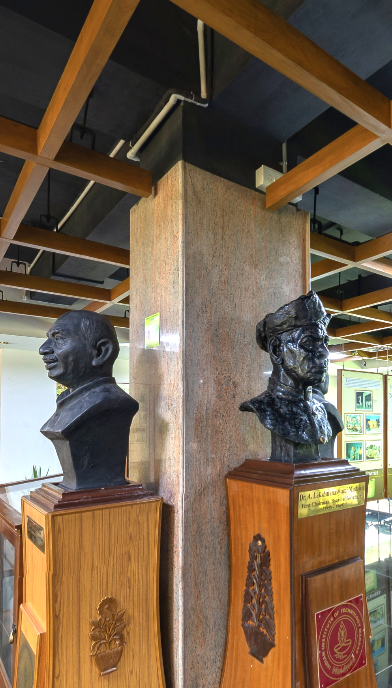Prof. K. A. V. Pandalai gives away a degree during the 13th convocation, 1976
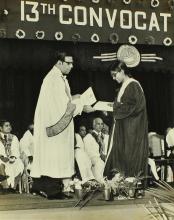
- Photographs , Convocations, Institute Events , 1970s
In the photograph, a girl student can be seen receiving her B.Tech. degree from the Director during the 13th convocation in 1976. Prof. B. S. Murthy (Department of Mechanical Engineering) is also seen seated in the background. During the year, approximately 21 female students graduated from the Institute. Apart from presenting the degrees to the students present, degrees were also given to students in absentia. The graduates were predominantly boys but as the years progressed there was an increase in the number of girl graduates. The first two girl…
Prof. K. A. V. Pandalai gives away a degree at the 13th convocation, 1976
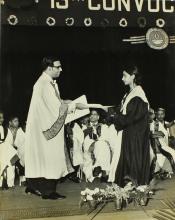
- Photographs , Convocations, Institute Events , 1970s
In the photograph, Prof. K. A. V. Pandalai (Director of IIT Madras) is seen giving away a B. Tech. degree to a student, while several faculty members (Heads of Departments) are seen seated in the background on the dais. During the year, approximately 21 female students graduated from the Institute. Prof. K. A. V. Pandalai was the third Director of IIT Madras. Prof. Pandalai did his early education in Kerala, after which he got a B.Sc. degree in Mathematics and Physics from Loyola College, Madras University, in 1947. He obtained his Master’s Degree in Aeronautical Engineering in 1950…
Senior administrators and faculty members of the Institute at the 13th convocation, 1976
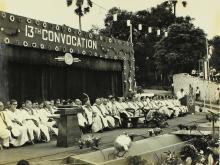
- Photographs , Convocations, Institute Events , 1970s
In the photograph, Prof. K. T. Chandy (Chairman, Board of Governors) is pictured delivering the convocation address. Other individuals seated in the front row of the dais during the 13th convocation include Prof. D. Venkateswarlu (Department of Chemical Engineering), Prof. Venkata Rao (Department of Electrical Engineering), Prof. B. S. Murthy (Department of Mechanical Engineering), Prof. K. A. V. Pandalai (Director), Dr. M. S. Swaminathan (chief guest), Prof. R. Srinivasan (Department of Physics), Prof. J. C. Kuriacose (Department of Chemistry), Prof. R. S. Alwar (Department of Applied…
A photograph of the audience during the 13th convocation, 1976
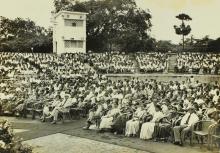
- Photographs , Convocations, Institute Events , 1970s
The venue of the 13th convocation which was the Open Air Theatre, can be seen flooded with individuals, functioning at full capacity. Among the audience, distinguished German guests are seen to be seated. The Open Air Theatre was designed after the Roman amphitheatre, with a capacity to house 7000 people or so. The inauguration of the Open Air Theatre took place during 1962, with the visit of His Excellency Dr. Heinrich Luebke, President of the Federal Republic of Germany. An identical photograph can be found in the Gourishankar Collection in…
The invitation to the 13th convocation of IIT Madras (1976)
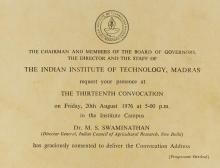
- Photographs , Convocations, Institute Events , 1970s
The invitation card for the 13th convocation utilised a format that was simple and formal. It was created using firm cartridge paper. On the cover, the details of the convocation (the name of the institute, 13th convocation, date, time) and the details of the chief guest were printed using black ink. The Institute emblem is also seen on the top printed in black ink. The 13th convocation of IIT Madras was held in the Open Air Theatre in 1976. Dr. M. S. Swaminathan (Indian Geneticist and Administrator) was the chief guest during the convocation. For both the graduating students and for all…
A view of the audience during the 13th convocation, 1976
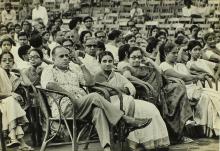
- Photographs , Convocations, Institute Events , 1970s
During the 13th convocation, a large audience can be seen seated in the Open Air Theatre. The Open Air Theatre had the capacity to hold about 7000 individuals or so during events. Usually each year, the convocation took place at the Open Air Theatre. During the convocation, the arrival of the chief guest who was received by the Director and the Registrar of the Institute was followed by events such as Guard of Honour, introducing the chief guest to the distinguished guests, an academic procession and an invocation. The Guard of Honour has not appeared in the proceedings since 1982…
Dr. M. S. Swaminathan addressing the audience during the 13th Convocation, 1976
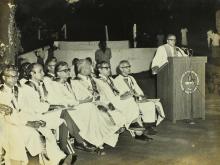
- Photographs , Convocations, Institute Events , 1970s
In the photograph, Dr. M. S. Swaminathan (chief guest) is seen addressing the audience during the 13th convocation which took place at the Open Air Theatre. Also seen in the photograph, from the left, are Prof. J. C. Kuriacose (Department of Chemistry), Prof. R. S. Alwar (Department of Applied Mechanics), Prof. H. N. Mahabala (Department of Computer Science), Prof. Sathyanarayana (Department of Chemical Engineering), Prof Ramani (Department of Humanities and Social Sciences) and Mr. C. V. Sethunathan (Registrar). During his convocation address, at the 13th convocation of IIT Madras, Dr. M.…
The audience at the 13th convocation, 1976
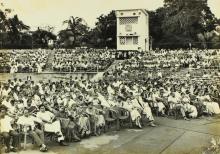
- Photographs , Convocations, Institute Events , 1970s
The 13th convocation of IIT Madras was held in the Open Air Theatre in 1976. Dr. M. S. Swaminathan (Indian Geneticist and Administrator) was the chief guest during the convocation. Among the large audience seated in the Open Air Theatre are two distinguished German guests seated in the front row. For both the graduating students and for all those who were a part of the Institute, the convocations were much-awaited events. The Institute invited distinguished chief guests for the convocations. Their convocation addresses or speeches have been highly inspiring. Two identical photographs…
Wind tunnel at the Applied Mechanics Department of IIT Madras
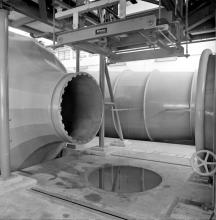
- Photographs , Academic Facilities, Departments , 1970s
The wind tunnel in the photograph was a part of the Applied Mechanics Department and was located in the Fluid Mechanics Laboratory (One of the workshop-type laboratories). It was assembled by a team of German technicians and it was operational by the late 1960s. Technically, it is a low-speed closed circuit, open test section variant with a single fan variable speed DC motor Ward Leonard Drive. The Applied Mechanics Department report published in Annual Report of IIT Madras 1969-70 notes that “The Wind Tunnel erection work including the calibration of the six component balance was…
Smoke nuisance test on model of SS State of Bombay
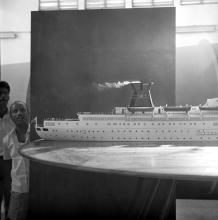
- Photographs , Academic Facilities, Departments , 1970s
In the 1960s, the Applied Mechanics Department of IIT Madras had a wind tunnel among its facilities. German technicians came to the Institute to assemble the tunnel which became functional in the late 1960s. It was used for industry work (smoke nuisance) and laboratory work for a few years. The wind tunnel was eventually dismantled some decades after it was put up. The gentleman in the image (second from left) has been identified as Mr. G. Srinivasan by Prof. P. A. Aswatha Narayana (Department of Applied Mechanics and Biomedical Engineering). He was a staff member at the laboratory. SS…
Wind tunnel at the Applied Mechanics Department of IIT Madras
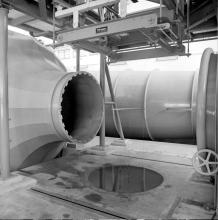
- Photographs , Academic Facilities, Departments , 1970s
The wind tunnel in the photograph was a part of the Applied Mechanics Department and was located in the Fluid Mechanics Laboratory (One of the workshop-type laboratories). It was assembled by a team of German technicians and it was operational by the late 1960s. Technically, it is a low-speed closed circuit, open test section variant with a single fan variable speed DC motor Ward Leonard Drive. The Applied Mechanics Department report published in Annual Report of IIT Madras 1969-70 notes that “The Wind Tunnel erection work including the calibration of the six component balance was…
Smoke nuisance test on model of SS State of Bombay
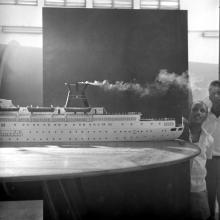
- Photographs , Academic Facilities, Departments , 1970s
In the 1960s, the Applied Mechanics Department of IIT Madras had a wind tunnel among its facilities. German technicians came to the Institute to assemble the tunnel which became functional in the late 1960s. It was used for industry work (smoke nuisance) and laboratory work for a few years. The wind tunnel was eventually dismantled some decades after it was put up. SS State of Bombay was one of the ships operated by the British India Steam Navigation Company, also known as the BI Line. The ship plied the India to East Africa sea lanes along with other ships such as the Karanja, Amra,…
Smoke nuisance test on model of ‘SS State of Bombay’
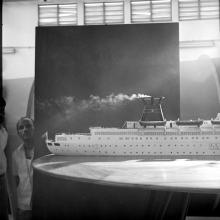
- Photographs , Academic Facilities, Departments , 1970s
In the 1960s, the Applied Mechanics Department of IIT Madras had a wind tunnel among its facilities. German technicians came to the Institute to assemble the tunnel which became functional in the late 1960s. It was used for industry work (smoke nuisance) and laboratory work for a few years. The wind tunnel was eventually dismantled some decades after it was put up. SS State of Bombay was one of the ships operated by the British India Steam Navigation Company, also known as the BI Line. The ship plied the India to East Africa sea lanes along with other ships such as the Karanja, Amra,…
Wind tunnel at the Applied Mechanics Department of IIT Madras
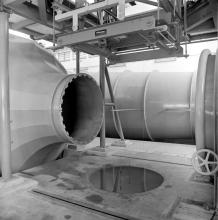
- Photographs , Academic Facilities, Departments , 1970s
The wind tunnel in the photograph was a part of the Applied Mechanics Department and was located in the Fluid Mechanics Laboratory (One of the workshop-type laboratories). It was assembled by a team of German technicians and it was operational by the late 1960s. Technically, it is a low-speed closed circuit, open test section variant with a single fan variable speed DC motor Ward Leonard Drive. The Applied Mechanics Department report published in Annual Report of IIT Madras 1969-70 notes that “The Wind Tunnel erection work including the calibration of the six component balance was…
Students participating in an event at Saarang 2003
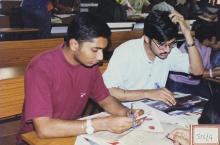
- Photographs , Cultural Activities, Cultural Events , 2000s
Saarang 2003; 22-26 Jan 2003
- Contribute
to the Centre -
Monetary
Support - Digital
Material

